posted November 14, 2021
Infuriated, I sat at my desk, reading yet another poll by the dairy industry investigating nutrition trends. This one specifically surveyed a thousand parents on their views and “confidence” around what they should be feeding their children.
As someone who loves research, I took some deep breaths to calm down my agitated sympathetic nervous system and decided to look at some “evidence” this poll had unearthed:
-
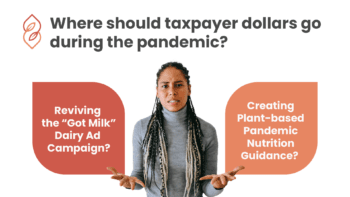
Image copyright owned by The Virsa Foundation Inc. Half of the 1,000 parents polled had no idea whether they are doing the right thing or not when it comes to their youngsters’ diet.
- Thirty percent didn’t know how to get their little ones to try new foods, while a quarter were confused about when to switch to cow’s milk after weaning.
- Another 16 percent used vitamins or fortified products to help give their children the right nutrition.
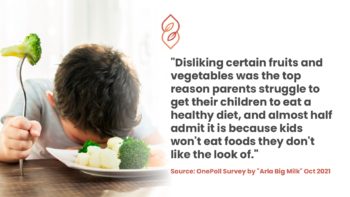
And, of course, the Big Dairy swooped in as a savior in multiple sponsored articles to save hapless and confused parents embattled with their offspring who simply “refused to eat fruits and vegetables.” They suggested a simple swap with vitamin-fortified dairy products offered the magical wand of complete, wholesome nutrition for developing minds and growing bodies of little humans without having to eat something awful, like a carrot or an apple. Preying on parental concern and honest confusion at its best.
I wondered if the parents were confused NOT just about what to feed their children, but also how to eat healthfully themselves.
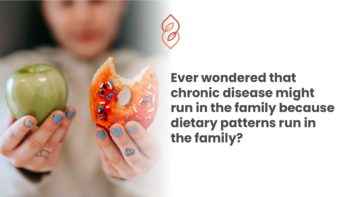
Another qualitative study was published about five months before this dairy industry-sponsored poll came out. Using in-depth interviews, this research sought to explore healthcare provider perceptions of parental feeding practices of infants and toddlers to prevent childhood obesity. Among other things, the study results included the following observation: “Sources of parental misconceptions about feeding were often related to cultural, familial, and media influences, or lack of knowledge about optimal feeding practices for infants or toddlers.” Recommendations, unsurprisingly, involved education materials appropriate for diverse cultural and literacy levels of parents, more “budgetary resources” for public health interventions, policy guidance, etc.
What stayed with me were these two words: media influences — incc other words, Media Determinants of Health, as a sub-set of Social Determinants of Health. Eighty percent of any health outcome is determined by Social Determinants of Health (SDOH), including factors such as access to nutritious food, transportation, income levels, air pollution, and social support. And, what we watch online and on TV has a huge impact on our daily food-related decision making.
In a nutshell, this is the problem we face in this country in regards to health education. We let the food industry educate the public and when they do so in a way that prioritizes their profit, we then hope to counter their influence on consumer behavior through poorly funded, low production-value, hardly compelling public health programming.
Unless of course, it’s the Got Milk campaign, easily the largest misinformed—and dare I say racially ignorant—public health campaign in the history of the United States.
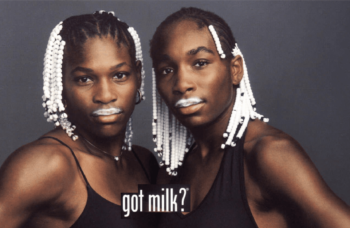
It pains me to know that the USDA chose to revive the Got Milk campaign at a time when American lives were being assaulted by a microscopic aggressor that feeds off the very inflammation caused by dairy and meat products. What’s even worse is that a new U.S. study shows childhood obesity sharply increased during the COVID pandemic.
While the USDA’s nutrition guidance includes fruits, vegetables, nuts and seeds, where subsidies are allocated is what really shapes and defines the US food system. Here’s a very informative video by Dr. Marion Nestle, the Paulette Goddard Professor of Nutrition, Food Studies, and Public Health at New York University, that explains this dilemma. In this lecture, she talks about how corporations affect our food choices.
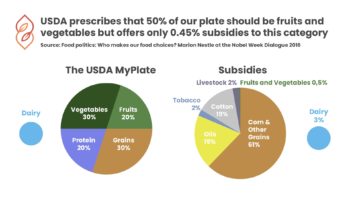
At my own nonprofit, The Virsa Foundation, through Project GAIA, we are busy investigating the correlation between dietary preferences and COVID-19 severity. Once we complete our data analysis, our team hopes to offer an evidence-based view on “Pandemic Nutrition Guidance.”
What Can You Do?
- When evaluating research, determine who conducted it and where the funding came from.
- When you spot a well-intentioned parent struggling with nutritional needs for themselves and/or their children, direct them to evidence-based whole food plant-based resources.
- Participate in the Project GAIA survey before it closes so we can include your plant-powered voice.
- Donate to plant-based nonprofits that are working hard to challenge media determinants of health with high-quality public health programming!

A connector at heart, Nivi Jaswal, MBA, NBC-HWC, MVLCE, builds strong teams inspired to deliver socially responsible projects with high community impact. She brings 15 years experience in marketing and corporate strategy in CPG, Life Sciences, Media, and Research industries. In various assignments across APAC, EU, the Mid East, and Africa, Nivi has managed large brands and complex projects involving innovation, consumer research, and communications development. She is a Professional Team Member of the American College of Lifestyle Medicine. At her nonprofit, Nivi brings together professionals with diverse specialties such as Anthropology, Psychology, Animal Rights, Social Work, Lifestyle Medicine, Filmmaking, and Creative Problem Solving to design Climate Conscious Plant Powered projects addressing chronic illness and encouraging emotional wellbeing. In 2020, Virsā launched the JIVINITI platform, advocating for low-income women of color, and the JIVINITI women’s coalition, comprising women leaders with plant-based nutrition, medical science, and social justice expertise.

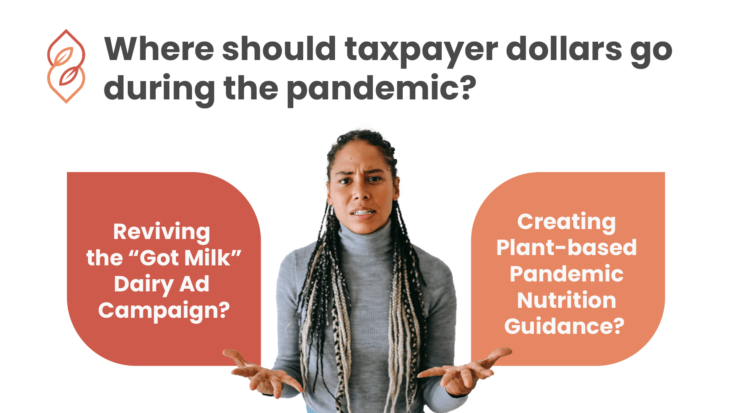
What an informative, well written letter. I hope that you have sent this to as many news outlets as possible to get this article read! Sincerely Ann
I had no idea that the milk mustache was back. I do find consolation, however, that they don’t have any new material.